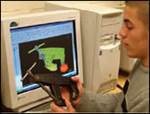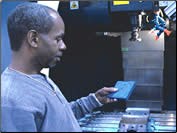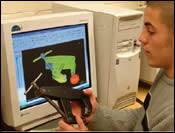Greenville Tech’s MTT Program: Mad for Machines
This technical school’s emphasis on the fine points of machining trains mold shop employees of the future.
Given the challenge that the industry faces today in attracting a younger, skilled workforce to replace those who are retiring, it is refreshing to see that Greenville Technical College’s (Greenville, SC) Machine Tool Technology (MTT) program is dedicated to teaching its students how to shape metal precisely by using machines such as the lathe, mill, band saw, CNC training and measuring instruments—turning them into the moldmakers, CNC operators and programmers, machinists and apprentices of tomorrow.
This college is the largest urban, public two-year college in South Carolina, and its curricular offerings include technical courses, certificates, diplomas and associate degrees in business, health sciences, engineering technologies, industrial technologies and public service; and, university transfer course and associate degrees in the arts and sciences. Over the last 18 years, the program has a semester range between 80 and 100 students.
According to Machine Tool/CNC Depart-ment Head Charles Wilson, Greenville is the manufacturing hub of South Carolina, and just as manufacturing is key to the economic vitality of the country, it is equally crucial to the prosperity of Greenville County—home to more than 600 manufacturers employing in excess of 48,000 people. “More than 20 percent of the local workforce has jobs in this field, which accounts for approximately 80 percent of the region’s capital investment,” he states. “Furthermore, the upper part of the state has 75 percent more manufacturing jobs than the average American community.”
Technical Training
The school’s CNC program is one of the best in the nation, Wilson emphasizes. “We remain well equipped through partnering with CNC manufacturing companies, distri-butors and receiving grants,” he comments. “Our instructors continually work to remain current and at the leading edge of technology. They are the key to our program and are selected very carefully. They must have an associate degree or higher in the field and five or more years experience in the field.”
Wilson adds that apprentice training is receiving much attention locally and is growing in need—and numbers. “The MTT program has seven registered apprentice programs and the list is growing,” Wilson comments. “Students generally remain at the companies where they apprentice. Our program posts jobs on a bulletin board and more jobs are usually posted than students seeking employment.”
The school has an Industry Advisory Committee that reviews the program yearly, looking at curriculum and facilities. The committee presents their recommendations to the administration, who Wilson notes “makes every effort to accommodate the committee’s recommendations. The strength of the committee is the current chairman, Carl Reid, owner of Advance Machine Co., Inc. [(Travelers Rest, SC)—a machine shop that performs general and precision machining, lathe and mill work]. He is always helping to strengthen the program with vendors, machine manufacturers and other industry.
“Carl is definitely not afraid to stand face to face and present the needs of the program,” Wilson continues. “He has been extremely instrumental in promoting business/education partnerships and has taken time off from his company to assist in developing these types of partnerships.”
Wilson notes that the MTT program “has long been known for producing graduates of high quality and graduates that are sought after nationwide.” Additionally, students from countries like Egypt, Pakistan, Russia, Colombia, Nigeria and Vietnam have attended Greenville Tech. “We, as instructors, feel that we can train almost anyone who is willing to listen and follow instructions,” he says. “Our graduates have been widely accepted by moldmaking firms throughout South Carolina and the country. The plastics industry is growing and must be supported in our technical programs. One of our largest, local plastics companies, who employs graduates of our programs, is Precision Valve (Travelers Rest, SC).”
Wilson helped student Brad Mullinax get a job at Precision Valve in mold repair before he gradated from the Machine Tool Program. “He then had me take classes in design so I could be a mold designer at Precision Valve. The training I received at Greenville Tech allowed me the opportunity to excel in my chosen field.”
Greenville Tech graduate Daniel Parks, a die engineer at Drive Automotive, a division of Magna International (Troy, MI)—a global supplier of technologically-advanced automotive systems, components and complete modules, notes that his education led to a great job. “I completed an associate degree from Greenville Tech while completing my apprenticeship at Drive Automotive,” Parks notes. “This education and training prepared me to be promoted from Journeyman Toolmaker to Die Engineer. I am the youngest toolmaker ever in Drive Automotive history to be promoted to Die Engineer. The Machine Tool Staff has a true interest in seeing their students successful.”
Advancing Manufacturing
Although the MTT program has realized long-term success, Wilson admits there is room for growth. “We see the need for advanced manufacturing to tie in with our current program, including robotics, vision systems, motor controls and sensors, programmable logic controllers, advanced CNC equipment, rapid prototyping machines and more materials training,” he notes. “Our plan is to seek more state support through equipment funding, legislative initiatives, grants and business/education partnerships to remain a training facility that will attract quality students and graduate a student that industry will be heavily recruiting. We currently have business/education relationship with Flint Machine Tools, Inc. and Absolute Machine Tool, Inc. (see Partnering with Business Sidebar).”
Wilson urges other schools to take the initiative as MTT has done. “I have learned that industry rules and all programs should be industry-driven to be successful,” he says. “Programs should continuously seek funding from all sources to remain current. At the top of the list is to have a desire to help students be successful and in doing so, you help his entire family. In our program, students know that we care for them and we will make every effort to see them successful in the field that they have chosen.”
Related Content
Making Mentoring Work | MMT Chat Part 2
Three of the TK Mold and Engineering team in Romeo, Michigan join me for Part 2 of this MMT Chat on mentorship by sharing how the AMBA’s Meet a Mentor Program works, lessons learned (and applied) and the way your shop can join this effort.
Read MoreUnique Mold Design Apprenticeship Using Untapped Resources
To help fill his mold design skills gap, Jeff Mertz of Anova Innovations, is focused on high schools and underprivileged school districts, a school that has lower graduation and college entrance rates. The goal is a student-run enterprise.
Read MoreMaking Quick and Easy Kaizen Work for Your Shop
Within each person is unlimited creative potential to improve shop operations.
Read MoreMMT Chats: The Science of Moldmaking, Part 2
In Part 2 of this two-part MMT Chat, Christina and Don continue their conversation by exploring lean manufacturing and tips on how to attract, train and retain the future workforce.
Read MoreRead Next
Molding New Moldmakers
One school—with industry’s help—is a model for our future moldmakers’ education.
Read MoreReasons to Use Fiber Lasers for Mold Cleaning
Fiber lasers offer a simplicity, speed, control and portability, minimizing mold cleaning risks.
Read MoreHow to Use Continuing Education to Remain Competitive in Moldmaking
Continued training helps moldmakers make tooling decisions and properly use the latest cutting tool to efficiently machine high-quality molds.
Read More


























